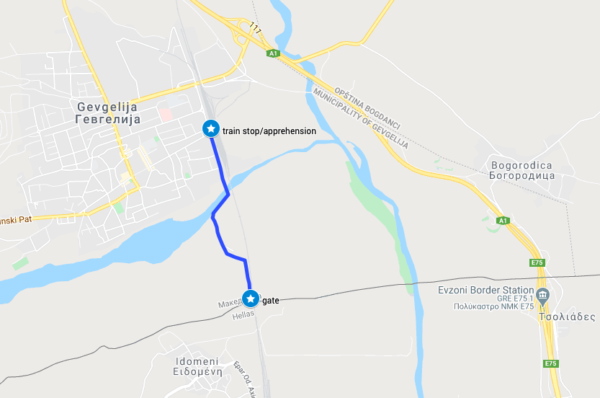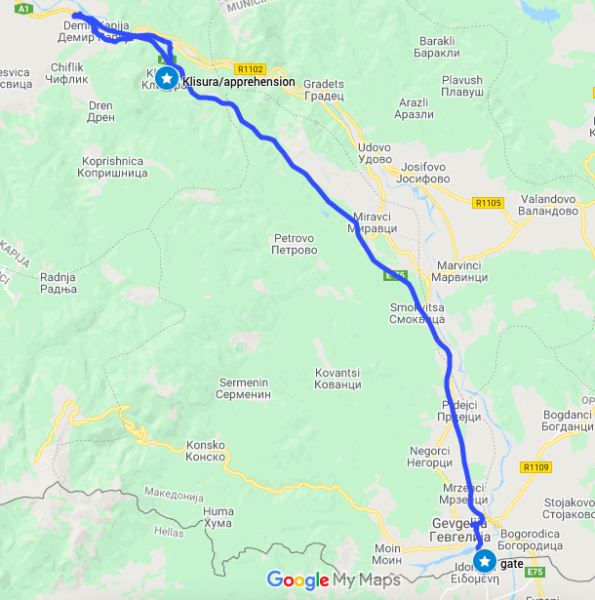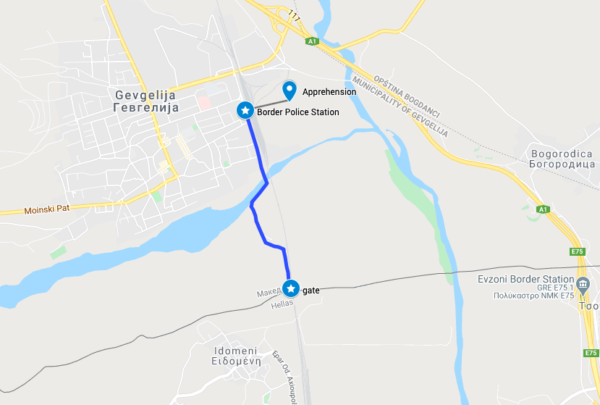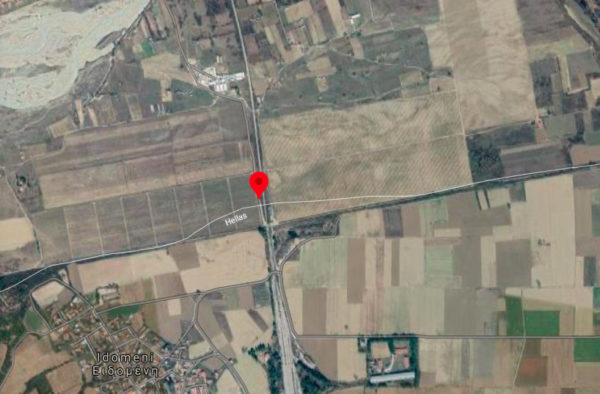If you come again, I will kill you!
| 01.11.2021 | Idomeni, Greece | Anonymous Partner | 41.1282225, 22.5170098 | North Macedonia | Greece | yes | yes | yes | no | no | no | no | 20 - 30 | 9 | Afghanistan, Demokratic Republic of Congo | no translator present | 10 | beating (with batons/hands/other), kicking, insulting, threatening with guns, gunshots | 4 North Macedonian police officers, dark blue uniform with North Macedonian flag on the shoulder, balaclavas, armed with rubber batons, metal batons and guns, 1 North Macedonian army officer, 1 dark blue police car, 7 North Macedonian police officers at the police station (6 male, 1 female), 1 North Macedonian police officer at the border |
The respondent is a 25-year-old man from Afghanistan. He was pushed back four times from North Macedonia to Greece between the 6th and the 11th of January, 2021. All of the pushbacks were performed through the same gate on the border near Idomeni, Greece. This will be analysed at the end of the testimony. Severe physical violence, as well as verbal threats, were used by North Macedonian police officers during the pushbacks, with the respondent describing the fourth incident as the worst. When he presented himself to the Border Violence Monitoring Network (BVMN), the respondent suffered from toothache and had abrasions on his face due to this event. As it is the most recent and was documented by the respondent the most exactly, the testimony describes the fourth pushback in the most detail. First pushback On the 6th of January 2021, at night, the respondent crossed the Greek-Macedonian border in a freight train. He had concealed himself underneath a wagon. Shortly after entering North Macedonia, near Gevgelija, the train stopped here and a police control was undertaken. Checking the wagon with torches, the officers found the respondent and apprehended him. He was loaded into what was described as a dark blue police car. When the respondent was ordered to enter the vehicle, an officer reportedly punched his shoulder. The respondent was driven to the border. At what was described as a “gate”, he describes being unloaded from the car and hit again by the same officer. The respondent was then pushed back to Greece. Second pushback On the night of the 8th of January, the respondent travelled to North Macedonia, again hiding under a freight train. Like before, he was detected by what he reported to be North Macedonian police officers and pushed back to Greece. This time, however, no violence was used by the officers. While the respondent waited on the Greek side of the border to leave again the next day, the hiding place he was sharing with other people-on-the-move (POM) was discovered by officers who the respondent alleges belonged to Frontex. This is based on the respondent's observation that the officers spoke German. Although he managed to evade them, they detained members of the group he had been with.
“They were counting them in German. Like ‘one, two, three – eins, zwei, drei’, so I knew definitely they are German, come on!”This use of German by the officers in Greece led to the respondent to conclude that they were Frontex. In fact, it is also possible that the described officers were Austrian. In another recent testimony recorded by the BVMN, this was the case for Frontex officers in the same geographical area. [caption id="attachment_16852" align="aligncenter" width="600"]
 First and second pushback (locations have been verified by the respondent, route is approximated)[/caption]
Third pushback
On the next day, the 9th of January, the respondent travelled to North Macedonia for the third time. In this attempt, he crossed the border on foot in the Gevgelija area and then continued walking through a forest. He was with a group of 11 POM.
When the group attempted to traverse the small village of Klisura in the middle of the night, their way was blocked by a unit of what the respondent reported to be North Macedonian police officers. The respondent supposed that they had used night vision cameras to detect them. The officers wore black balaclavas and dark blue uniforms with the North Macedonian flag on the shoulders. The respondent described that they were armed with guns, rubber batons as well as metal telescopic batons.
Upon encountering the group, the officers reportedly fired their guns in the air. “I think they shot in the sky to stop us”, the respondent explained.
After that, the respondent and the people he was with ran away. While most of them managed to escape, the respondent stumbled in a hole and fell. Still lying on the ground, two police officers approached him.
First and second pushback (locations have been verified by the respondent, route is approximated)[/caption]
Third pushback
On the next day, the 9th of January, the respondent travelled to North Macedonia for the third time. In this attempt, he crossed the border on foot in the Gevgelija area and then continued walking through a forest. He was with a group of 11 POM.
When the group attempted to traverse the small village of Klisura in the middle of the night, their way was blocked by a unit of what the respondent reported to be North Macedonian police officers. The respondent supposed that they had used night vision cameras to detect them. The officers wore black balaclavas and dark blue uniforms with the North Macedonian flag on the shoulders. The respondent described that they were armed with guns, rubber batons as well as metal telescopic batons.
Upon encountering the group, the officers reportedly fired their guns in the air. “I think they shot in the sky to stop us”, the respondent explained.
After that, the respondent and the people he was with ran away. While most of them managed to escape, the respondent stumbled in a hole and fell. Still lying on the ground, two police officers approached him.
“When they took me outside [the hole], they started hitting me. They kicked me in my ribs two times, and they hit me with the sticks [rubber batons] so many times on my hands. I was just protecting my head, like to not have a big injury on my head.”The respondent and one of his companions, a 23-year-old Afghan man, were reportedly apprehended and loaded into a “dark blue” police car. The officers were believed to speak in Macedonian by the respondent. The officers drove the two men back to the Greek-North Macedonian border. According to the respondent, the drive lasted between 1.15 and 1.30 hours. Like before, they were pushed back through the gate near Idomeni. [caption id="attachment_16854" align="aligncenter" width="595"]
 Third pushback (locations have been verified by the respondent, route is approximated)[/caption]
Fourth pushback
The respondent’s fourth attempt to enter North Macedonia was on the night of the 11th of January. With a group of nine POM, he crossed the border on foot again, similarly to the previous occasion.
The group consisted of a woman and her husband from the Democratic Republic of Congo and seven Afghan men, the respondent and his companion from the third pushback included. The respondent estimated that all the members of the group were between 20 and 29 years old.
At around 5:00 a.m., the group crossed this bridge in Gevgelija. There, they were discovered by the police who shone flashlights at them. The group managed to run away and hide. However, a short time after this incident, they proceeded walking and a police car with its headlights off appeared.
Third pushback (locations have been verified by the respondent, route is approximated)[/caption]
Fourth pushback
The respondent’s fourth attempt to enter North Macedonia was on the night of the 11th of January. With a group of nine POM, he crossed the border on foot again, similarly to the previous occasion.
The group consisted of a woman and her husband from the Democratic Republic of Congo and seven Afghan men, the respondent and his companion from the third pushback included. The respondent estimated that all the members of the group were between 20 and 29 years old.
At around 5:00 a.m., the group crossed this bridge in Gevgelija. There, they were discovered by the police who shone flashlights at them. The group managed to run away and hide. However, a short time after this incident, they proceeded walking and a police car with its headlights off appeared.
“The light was off, everything was off, so it was so dark, we can’t see. And then they said “Police, stop! Don’t move!”The respondent stated that four police officers and one army officer were present. The police officers were described the same as before: dark blue uniforms with the North Macedonian flag on the shoulder, black face masks, guns, rubber batons and metal telescopic batons. The military officer was wearing an “army uniform”. Fleeing from the officers, the respondent became trapped behind a fence on the side of a field.
“So the cops caught me, and they said: ‘Lay down on the floor!’. I layed down. They kicked me in my face, then they kicked me in the other side of my face, so it was so painful, it was bleeding a lot. They kicked me with their shoes. And also, they were hitting me with the stick [rubber baton] everywhere.”At the same time, the 23-year-old Afghan man who had been pushed back with the respondent two days before, was also reportedly severely beaten by the officers.
“They hit my friend with the stick [rubber baton] in his head a lot, so it was a really big cut here [pointed at his eyebrow].”After the assault, the two men were ordered to lay down on the floor next to the police car for approximately 20 minutes. The respondent recalled that the apprehension took place in this location. Then, they were accompanied by two officers to the Border Police Station of Gevgelija on foot. At the station, they were commanded to sit on the floor and wait for a police car to pick them up. The respondent stated that even though they were both badly injured, no medical assistance was provided.
“We were just sitting on the floor, and my friend was bleeding a lot from the head, they didn’t ask anything like ‘do you need tissue paper, clean yourself’, nothing.”The respondent recalled that seven or eight police officers were present at the station, one of them female and the rest male. Outside of the police station, the respondent and his friend were loaded into what was described as a dark blue police car. They were driven towards the border. On the way, the Congolese couple that had been with them before was also loaded into the car. The four were driven to the gate at the Greek-North Macedonian border. According to the respondent, the drive took 15 to 20 minutes, including picking up the couple. At the border, before the group was pushed back, the respondent and his Afghan companion were reportedly verbally abused by an officer. The respondent described the officer as a man of approximately 48 years, who was in charge of opening the gate and ordering them into Greece.
“He was like: ‘Why you don’t go to America, why you don’t go there! You are all Taliban, if you go to America, they will fuck you!’, something like this. And he was showing us a bad sign, like a gun with his hand, like ‘I will kill you’. He said: ‘Don’t come again, if you come again, I will kill you!”After that, at around 6:00 a.m., the group was pushed back to Greece. There, in the dawn, the respondent provided first aid to his companion, who was still bleeding badly, before they travelled back to Thessaloniki together.
“I respect your [the police’s] work, because you are protecting your country. But this is not the way. If you catch us, no problem. It’s your work, it’s your job, it’s your service. [...] But if you hit us, then we get a bad image about European country. It’s not nice, and it’s completely illegal.”[caption id="attachment_16853" align="aligncenter" width="600"]
 Fourth pushback (locations have been verified by the respondent, route is approximated)[/caption]
Gate on the Greek-North Macedonian border
Across all four episodes, the respondent was pushed back through a gate on the Greek-North Macedonian border. Something similar has been described in a large number of testimonies recorded by the BVMN, one of them indicated here. Broadly, they note that there is a quasi-official gate in the border fence located between the settlements of Gevgelija, North Macedonia and Idomeni, Greece, which is systematically used to stage pushbacks.
The gate is situated in a remote location next to the train tracks leading from Thessaloniki to North Macedonia. It is west from the Evzoni Border Station, which is the official border station at the main road crossing between North Macedonia and Greece. The police seem to benefit from the level of privacy afforded by this location, as they regularly use it to perpetrate unchecked violence.
An overview of this practice is given in the Balkan Region Report of December 2020.
[caption id="attachment_16851" align="aligncenter" width="600"]
Fourth pushback (locations have been verified by the respondent, route is approximated)[/caption]
Gate on the Greek-North Macedonian border
Across all four episodes, the respondent was pushed back through a gate on the Greek-North Macedonian border. Something similar has been described in a large number of testimonies recorded by the BVMN, one of them indicated here. Broadly, they note that there is a quasi-official gate in the border fence located between the settlements of Gevgelija, North Macedonia and Idomeni, Greece, which is systematically used to stage pushbacks.
The gate is situated in a remote location next to the train tracks leading from Thessaloniki to North Macedonia. It is west from the Evzoni Border Station, which is the official border station at the main road crossing between North Macedonia and Greece. The police seem to benefit from the level of privacy afforded by this location, as they regularly use it to perpetrate unchecked violence.
An overview of this practice is given in the Balkan Region Report of December 2020.
[caption id="attachment_16851" align="aligncenter" width="600"] Location of the gate at the Greek-North Macedonian border[/caption]
Location of the gate at the Greek-North Macedonian border[/caption]
